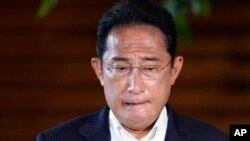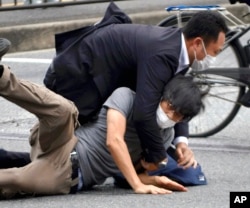Japan’s conservative ruling coalition appears likely to maintain its majority in the upper house of parliament, in a Sunday election that came two days after the assassination of former Prime Minister Shinzo Abe.
The ruling Liberal Democratic Party (LDP) and its junior coalition partner, Komeito, are projected to win more than half of the seats in the House of Councillors, according to exit polls by state broadcaster NHK and the Kyodo news agency.
According to the polls, forces that support a revision of Japan’s pacifist constitution were also expected to maintain two-thirds of seats in the upper chamber — an important threshold that could make such a constitutional revision more likely.
The outcome would provide a major lift for Prime Minister Fumio Kishida, an Abe protege who has implemented a more assertive foreign policy and wants a major boost in defense spending.
The LDP, which has ruled Japan almost continuously for over six decades, was widely expected to achieve a solid win. But observers were watching to see if Abe’s death could spur a sympathy vote for the party.
Abe, Japan’s longest-serving prime minister, was shot and killed Friday while campaigning on the street in Nara, Japan. Though campaigning mostly stopped after Abe’s assassination, the vote proceeded as planned. Kishida said the country must “protect democracy without yielding to violence.”
Suspect mad at religious group
Police immediately detained the alleged assassin — 41-year-old Tetsuya Yamagami, a former member of the country’s Self-Defense Forces.
Police say the suspect believed Abe to be a part of an unspecified religious group he blamed for his mother’s financial ruin. While he has said he intended to kill Abe, he insists his motives were not political, according to police.
Yamagami used a crude-looking, homemade gun in the shooting; police recovered more such weapons at his home. He told police he made the guns by wrapping steel pipes together with tape, according to NHK.
Yamagami told authorities he originally planned to use explosives to kill Abe at another nearby event, but decided the Nara event would be more accessible, NHK reported.
The assassination shocked Japan, which has strict gun laws and almost no gun violence. The country has not seen political assassinations in decades.
Security was tightened at many campaign events following the shooting, raising the prospect of permanent changes to Japan’s very accessible and intimate campaign environment.
Police have acknowledged major security lapses at the event where Abe was killed. Videos show the assassin casually walking up to Abe, without being stopped by security.
Abe resigned as prime minister in 2020 but remained an LDP power broker and a high-profile proponent of Japan taking a more active role in the world.
Bolder defense approach
The LDP aims to roughly double defense spending to 2% or more of gross domestic product over the next five years. The party would also like to revise the country’s pacifist constitution, which has not been changed since coming into effect in 1947.
Although polls suggest the Japanese public is broadly supportive of Japan taking a bolder foreign policy approach, voters remain deeply averse to the country becoming involved in military conflicts.
Any constitutional change must be approved by two-thirds of both houses of parliament (pro-revision forces already have a two-thirds majority in the lower house). A revision must also be approved by a majority of voters in a referendum.
Recent polls suggest voters remain divided over the idea of a revised constitution. Many say they prefer the government to focus on improving the economy, amid the rising cost of living.
However, analysts note that Kishida may use the upcoming period to take bolder steps, since he will not face another election test for three years.











